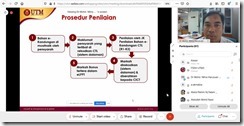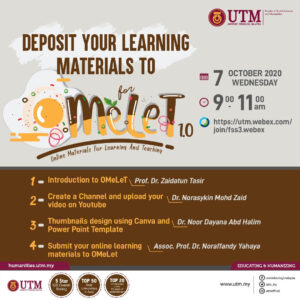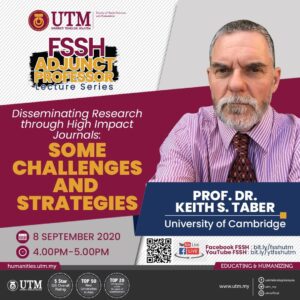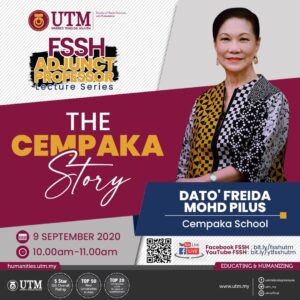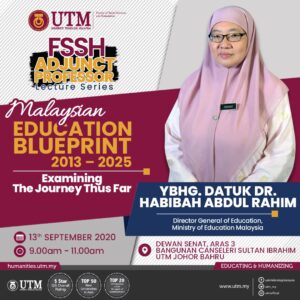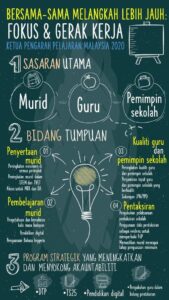For this semester 2, session 2020/21, I intend to use Padlet again. Well, I subscribed for a year so might as well I use it extensively. I don’t care if people call me as Padlet’s instructor or not as long as students could enjoy learning activities using Padlet. Nothing else matters.
Category: Teaching
E-Content: Tips that I get from my colleagues
Yesterday, the UTMLead organized a session conducted by Assoc Prof Dr Mohd Nihra Haruzuan about E content. I was a bit late because I had a meeting with the Chair earlier.
Alhamdulillah I managed to join the session before it was ended. There are some tips that I managed to pick up from those who managed to get 5 marks for their e-content. Here are the tips:
1) Diversify your e content materials.
Make sure that you add a variety of materials for your e-content. Variety does not mean a lot. So, if you add only ONE material that worth 5 marks, you can get 5 marks. If you add 5 materials that worth 1 mark each, you will only get 1 mark.
So, why wasting your time to upload 5 materials which equivalent to 1 mark? On top of that, you can only claim one material once in your e content. Meaning, once you have submitted for the material to be evaluated in your e content, you cannot submit it again on the following years EXCEPT if you make some changes like adding more information and such.
Moral of the story: you need to diversify your materials which belong to different categories of e content materials that carry different weightage of marks to get 5 marks.
For example, add 1 Powerpoint notes with your voice (it is considered as a receptive material. 1 mark). A Powerpoint notes with your voice recorded is considered as receptive material because the students do not interact with the material. They just watch and listen to your recorded material, in this case.
For 2 marks material, you need to add the element of “having a linkage with another source” such as you link a video within your note or you have animation in your normal Powerpoint note. But, please bear in mind, if you add a video in your Powerpoint notes, the size of the file would be large. If you add a video in your Powerpoint notes (with recorded voice), and later on you save it as MP4, the size of the file would also be large.
Other than Powerpoint notes, you can add another material like Gamification by using Quizziz or Kahoot! in which students need or have the chance to interact with the media. When you use Quizziz or Kahoot!, you create a question (you can add picture in your question) that prompt students to answer it. Answering your questions is an example of interaction that students have with the material, which is in this case, Quizziz. For this kind of materials, you get 3 marks (interactive-basic).
If Quizziz or Kahoot! alone, it is considered as interactive on one to one basis. So, it might be considered as 3 marks [but based on my own experience, I only got 2 marks for this so, I clearly do not understand how the rubric works as it might depend on the evaluator (REALLY!)] . So, do not blame me if I have misconception about e-content as I still remember what it was said in one of the sessions “Terpulang kepada penilai nak beri markah berapa“.
For 4 marks, you need to make sure there are elements of interaction which is linked either internally or externally. I have no idea about an example of this. But basically, for 3-4 marks, there are the elements of students interaction with the material which the interaction is one to one basis (student –> material), not involving the interaction with another students for brainstorming ideas, responses or answers. Don’t ask me further about the examples of materials that fall under this category (4 marks). But, I would like to experiment with a material that I created this semester. A video that I uploaded on Youtube.
Note: When I created the video, I thought about what are the elements of interaction that I can inject in the video? One of my colleagues suggested that perhaps I added a question or two at the end of the video. I tried to find more information and examples from Youtube. I found several examples of videos which use Powerpoint with audio i.e. voice which have questions and students or others who watch the video can leave answer on the comment box. Interesting, isn’t it? But I don’t know if this material would be considered as 4 marks category. There is no harm in trying, right? So, I will try it this year. I will let you know the results next year, In shaa Allah.
For 5 marks, you have to make sure that there are the elements of cooperative learning in which students are able to discuss with one another through the material (e content material) that we provide them with. A good example that I could think of is, Padlet (make sure you set it as public viewing). Padlet is a platform for the interaction to occur with materials that you provide in the Padlet. It is like a one-stop-centre where you can put your material, questions for students to answer and discuss.
In a Padlet page or worksheet or whatever you may call it, to make sure you can create the situation in which students can interact with materials and discuss with one another make sure you have the following:
a) Give clear instructions that require students to use the materials that you/other students provide. It could be reading materials such as a short article or it could be a video. Put that in your Padlet. In addition, instruct your students to read other person’s answer (response) and give their view/ opinion about that – this will create a discussion indirectly.
b) Post questions that prompt students to answer based on what they have read (if it is reading material) or watched (if it is a video).
c) Emphasis the importance of giving comment/ response to other person’s answer in a given box (you can set a column or box for students to leave a comment underneath another column or box).
d) Make sure you monitor the discussion and give your comment or feedback through the Padlet or when you have a synchronous class. There you go. 5 marks!
Note: When I first posted this post, it was the second week of the semester. So, even though I have prepared a Padlet with questions and whatsnot, I did not have the complete version yet because it lacks of students’ feedback and interaction. Alhamdulillah, I manage to get the students to give their answers and such on Week 3. So, here is the example of a Padlet which contains the following:
a) Materials that students can refer to (I gave students a Prezi note and two articles that they need to read before answering the questions that I posed). I use external materials in this case. Other than the articles, I linked my Prezi note. [How about others who have limited internet connectivity who cannot view the Prezi note through online? Since it is a paid version that I use so I also gave the students the PDF version as an alternative to the online version on the ELearning and our class Telegram].
b) Questions that prompt students to give their answers. For the Padlet, I set the setting in which students not only can read others’ answers but also can reply or response to others’ answers and such. So, it has the elements of discussion – but it is done virtually.
So, there you go! You can have a cooperative learning technique such as Buzz Group. In a normal case, you have to limit the number of students in one group for this activity. But, since we need to conduct our class virtually and due to internet constraints that might be experienced by some, we can allow the students to respond with limited time frame. Why limited? This is to ensure the students will not take more than a few days to give their response.
2) Be creative.
3) Make sure the materials are YOURS.
4) Don’t be afraid to experiment with a new thing.
COVID-19: KURSUS REPOSITORI MEDIA PENGAJARAN DAN PEMBELAJARAN (ONLINE MATERIALS FOR LEARNING AND TEACHING (OMeLet)
I like the picture in your webometrics
One of the juniors asked me where do I get the picture from for this blog. Well, it is a picture that I took long time ago when I was in Durham. It was autumn. Durham has a picturesque landscape. Every nook and corner is breathtaking. I am glad that I decided to do my PhD there even though I vividly remember some of my friends mocked my decision of going there because Durham is less unknown as Cambridge or Oxford. Yeah right. That is a common assumption by some Malaysians about Durham.
I like the picture because it shows a canoeist in the River Wear (Note: Durham has its own rowing club). Yup. The name of the river is River Wear.




FSSH Adjunct Professor Lecture Series: YBhg Datuk Zunaidah Idris
COVID-19: Using Telegram, rather than Whatsapp for teaching
Last semester, when the COVID-19 hit us all over the globe (well, except some remote islands like Vanuatu and such), I was thrown into a realm of uncertainty. There goes my hands-on activities and the worksheet that I have prepared but I know that I cannot let myself into the abyss of despair. Knowing my own ability on ICT and whatsnot, I know that I have to learn something new. I push myself to learn something that I would never think to try such as video making and editing. But I am still learning it though. Even though I have created five videos so far, I am still far from being an expert. Nope. One thing at a time.
Some said that rather than using Whatsapp, using Telegram is much helpful. Full stop. No specific explanation is given. I know that I cannot rely on others to learn new things but there are so many things on my hand that I could handle. This is how I feel at times.
Alhamdulillah, I met a junior who is willing to show me how she uses Telegram by showing one or two examples from her last semester class. So, since the only small group that I have is the English teachers group that I have since Latihan Ikhtisas, I asked them if I could run a test by using them as my guinea pig. Well, being ever willing to be in any of my project and experiment, they said ok. So, I did a quick test on them when I created a poll using VoteBot on Telegram. Darn! How I wish I learn this before. It could make the class discussion more interactive because I can pose a question like MCQ and whatnot by using VoteBot.
There are so many other things that I need to learn but one thing at a time. Alhamdulillah.
Konsep Tawakkal kepada Allah SWT
Fakta-fakta penting berhubung Tawakkal :
(1) Tawakkal kepada Allah adalah menifestasi dari Kalimah Syahadah pengakuan Kalimah La-Ilaha Illallah. Dalam ertikata lain Tawakkal kepada Allah adalah cetusan dari Iman yang sebenar / Tauhid yang hakiki.
(2) Bicara berkenaan Tawakkal berkait rapat dengan Taqdir, Qadha Qadar, Kuasa Mutlaq Allah Ta’ala, Af’al Allah (Perbuatan Allah) dan af’al makhluq,
(3) Setiap orang beriman di perintah Tawakkal kepada Allah semata2 dan jauhi sama sekali Tawakkal kepada makhluq. Tawakkal kepada Allah adalah tanda-tanda Keimanan dan Tawakkal kepada makhluq adalah menyalahi Tauhid, menjadi Syirik khafi.
(4) Menyandarkan apa jua amal ibadah kepada usaha ikhtiar, kemampuan diri atau kekuatan diri adalah termasuk Syirik khafi.
(5) Bergantung hati kepada makhluq untuk memberi manfaat atau menolak mudarat adalah Syirik khafi.
(6) Menggantungkan apa jua kejayaan atau kemenangan kepada usaha ikhtiar, kemampuan diri atau kekuatan makhluq lainnya adalah Syirik khafi.
(7) Tawakkal kepada makhluk adalah Syirik khafi yang paling halus dan hampir-hampir tidak dapat dikenali oleh orang-orang awam. Lazimnya orang-orang awam tidak peduli akan hal ini kerana tidak mempunyai pengetahuan berkenaannya, akibatnya mereka selalu lah bergelumang di dalam Syirik khafi tanpa mereka tidak sedar.
(8) Orang alim (yang tidak mendidik hati nya dan tidak berusaha menyucikannya dengan pimpinan Mursyid yang siddiq) juga tidak mampu melepaskan diri dari Syirik khafi yang paling halus ini. Meskipun mereka mempunyai pengetahuan berkenaan dengannya, mereka seringkali terjatuh kerana wujud sifat “keakuan” di dalam dirinya.
(9) Seseorang yang memandang keupayaan diri, melihat kemampuan diri melakukan suatu kebaikan serta menyandarkan amal ibadah kepada kekuatan diri ini adalah Syirik khafi kerana mempersekutukan Allah pada Af’alNya dan Sifat Nya Yang Maha Berkuasa memperbuat segala sesuatu.
(10) Memandang keupayaan diri, atau melihat kemampuan diri untuk melakukan suatu kebaikan atau menyandarkan amal ibadah kepada kekuatan diri ini berbeza dengan ‘Ujub. Orang ini BUKAN ‘Ujub tetapi lebih halus dari ‘Ujub. Orang yang ‘Ujub mempunyai sifat “bangga, megah, takjub, hairan dengan suatu kelebihan dirinya”, sedangkan orang yang menyandarkan amal kepada diri sendiri TIDAK mempunyai sifat-sifat demikian, tetapi dia hanya melihat keupayaan serta kemampuan diri melakukan ketaatan dan ini juga termasuk dalam Syirik khafi.
(11) Fahamilah dengan sungguh-sungguh: Menyandarkan amal kebaikan kepada keupayaan diri atau bergantung harap kepada keupayaan makhluq merupakan Syirik khafi yang penghabisan yang teramat halus. Apabila seseorang lepas bebas dari Syirik khafi penghabisan ini, maka barulah di katakan dia telah memiliki jiwa murni serta Tauhid hakiki.
Sesungguhnya hal ini amat rumit sekali dikesan oleh mereka yang tidak menuntut jalan menyucikan hatinya.
Sumber: MAJLIS TAZKIRAH JILANI
FSSH Adjunct Professor Lecture Series: Prof Dr Keith Taber
FSSH Adjunct Professor Lecture Series: Dato’ Freida Mohd Pilus
I could not attend the FB live session as I had to attend a briefing by Yayasan Inovasi Malaysia (YIN). So, I watched the recorded video on Youtube. What could I say other than “Wow”. She is the epitome of resilience, elegance and intelligence. From a mother’s wish to give the best education to her five children, she embarked on a journey to establish a private school in 1983 which might be considered as a brave endeavor.
She is 73 years old this year and does not look like one. Her passion on teaching is displayed throughout the session. With twinkling in her eyes, she answered questions posed by audiences without missing a beat and kept herself poise as always.
I don’t know if I can be like her. To have such strong determination and perseverance to achieve her dreams without losing hopes. But I notice that she emphasizes several key points through examples. Among the key points that are being emphasized are: working hard, be passionate about what you do, believe in your dreams and not losing hopes easily when things are the hardest. Something that I could not miss.
I would try to emulate her and hope one day I could pass her wisdom to others.
FSSH Adjunct Professor Lecture Series: YBhg. Datuk Dr Habibah Abdul Rahim
Malaysia Education Blueprint 2013-2025:….. Examining the journey thus far
Key points:
- Challenges due to unforeseen event i.e. COVID-19 pandemic prompt teachers, parents and students to adjust to the new norms. It is not easy to ensure the practice of physical distance yet learning has to happen no matter what. It prompts all respective parties to use digital learning to the max.
- The priorities of education would always have to be translated into action regardless of whatever event that could derail the progress of learning at institutions level (schools and higher education institutions).
- Malaysia Education Blueprint set the stage of where our education is heading forward but we have to understand the current performance and challenges of education system, establish a vision and aspirations for the system and students and outline the transformation program for the system.
- Outlining the current blueprint is not about just preparing the document but how we would deliver the vision and aspirations (policies) at various levels through dedicated teams.
- There are 11 key shifts to achieve aspiration (refer to the first 4 chapters in the blueprint): access, quality, equity, unity, efficiency, empower, ICT, transform (accountability), partnership, budget, transparency
- Rigorous monitoring process: with KPIs, charters and budgeting to ensure continuous supports are delivered and accountability to be assured.
- 2-12% of students are not in schools for various reasons and yet, there are various attempts, efforts and programmes have been and are being delivered.
- Access to technical and vocational education is one of the main agenda = to enhance technical skills among students
- Address the issue of transitioning and dropping out especially among the most disadvantaged i.e. students from Orang Asli community (the rate of completion is still low)
- New assessment i.e. UPSR and such somehow poses another challenge to improve and bridge the gap of dropping out and school completion among students especially the disadvantaged.
- Participation in STEM subjects especially in pure sciences subjects has been steadily declined over the years especially as students pursue their education at higher level i.e. post secondary education. 1/5 of students who originally from pure science stream would going to further their study in pure sciences field at post secondary education.
- The quality of education system would not exceed the quality of teachers. The quality of education depends on the quality of teachers. Thus, it is important to ensure we provide the best training teacher education to pre-service teachers. 450k teachers (young teachers) are currently work as teachers in Malaysia and to enhance proficiency in English based on the alignment of CEFR. For the time being, it is only meant for English teachers.
- Digital competency among students (primary and secondary) is skewed in which those who go to schools equip with good ICT facilities would have better digital competency.
- The ecosystem within the school is related to students’ competency on digital skills.
- Zero Reject Policy is in motion with various programmes such as programmes for special needs students, programmes for children of migrants or asylum seekers, ziarah cakna and such.
- The emphasis on the results is still prevalent in Malaysia. We often ask “How many As do you get?” rather on the question “What have you learned over the 11 years of schooling?”
- The societal value (in Malaysia) makes it a challenge to change the current practice in which teachers still practice “teaching to the test” i.e. teachers teach what would be “appeared” in the examination.
- School completion requires students to have minimum expected skills and knowledge as set by the Ministry of Education (education system) to ensure our future generations would be future proof to face 4IR challenges.
- Selection of those undergoing teaching training programmes has been improved and also, there are continuous programmes given to current teachers to enhance their teaching practice.
- School leadership is the 2nd biggest factor influencing students’ learning after teachers’ instructional delivery. Thus, it is important to emphasise on the preparation of instructional planning and delivery than administrative aspects.
- COVID-19 has given impacts on society at various levels especially the most affected are the vulnerable (the disadvantaged).
- DELIMa (Digital Educational Learning Initiative Malaysia) is a culmination of efforts from the ministry along with Google, Microsoft and Apple. Yet, it is all go back to the issues of teachers and students’ preparedness in online learning, digital divide and connectivity as well as providing support to the most vulnerable including students with disability.
- The accuracy of information and speed of information delivers from various parties to different levels of parties.
